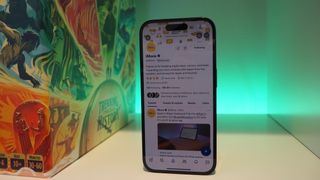Twitter DMs are now encrypted but there's one huge catch
It's going to cost.

The Twitter that we see today is almost unrecognizable from the one that Elon Musk bought for $44 billion in late 2022 and now the social network has launched a new feature that was promised way back then — encrypted direct messages.
The new encrypted DMs have now gone live for the first time with people able to choose whether they actually want to use it when creating a new thread. What's more, they can also choose to send an encrypted message via a thread that was previously unencrypted.
And it's all live now — assuming you're willing to pay for it.
No encryption for you
Twitter has a new support page (opens in new tab) that explains how encrypted DMs work, and while it's very wordy it does do its best at getting the job done. "Twitter seeks to be the most trusted platform on the internet, and encrypted Direct Messages are an important part of that," the page starts.
It then sets out the plan. "As Elon Musk said, when it comes to Direct Messages, the standard should be, if someone puts a gun to our heads, we still can’t access your messages," the page continues before admitting that it isn't "quite there yet." Still, encrypted messages are here.
However, they're only available if both the sender and recipient of the DM happen to be verified. That could mean they're part of a verified organization or, more likely, that they're paying for Twitter Blue.
As for how it's encrypted, Twitter's explanation is that it will "generate a pair of device specific keys, called private and public key pair." It goes on, adding that "the public key is automatically registered when a user logs into Twitter on a new device or browser; the private key never leaves the device and therefore is never communicated to Twitter."
From there, we learn that there's also "a per conversation key that is used to encrypt the content of messages. The private-public key pairs are used to exchange the conversation key securely between participating devices."
Of course, none of that matters if you aren't paying for Twitter, and, if reports (opens in new tab) are true, few people actually are.
Get more iMore in your inbox!
Our news, reviews, opinions, and easy to follow guides can turn any iPhone owner into an Apple aficionado

Oliver Haslam has written about Apple and the wider technology business for more than a decade with bylines on How-To Geek, PC Mag, iDownloadBlog, and many more. He has also been published in print for Macworld, including cover stories. At iMore, Oliver is involved in daily news coverage and, not being short of opinions, has been known to 'explain' those thoughts in more detail, too.
Having grown up using PCs and spending far too much money on graphics card and flashy RAM, Oliver switched to the Mac with a G5 iMac and hasn't looked back. Since then he's seen the growth of the smartphone world, backed by iPhone, and new product categories come and go. Current expertise includes iOS, macOS, streaming services, and pretty much anything that has a battery or plugs into a wall. Oliver also covers mobile gaming for iMore, with Apple Arcade a particular focus. He's been gaming since the Atari 2600 days and still struggles to comprehend the fact he can play console quality titles on his pocket computer.
Most Popular

By Kevin Lynch